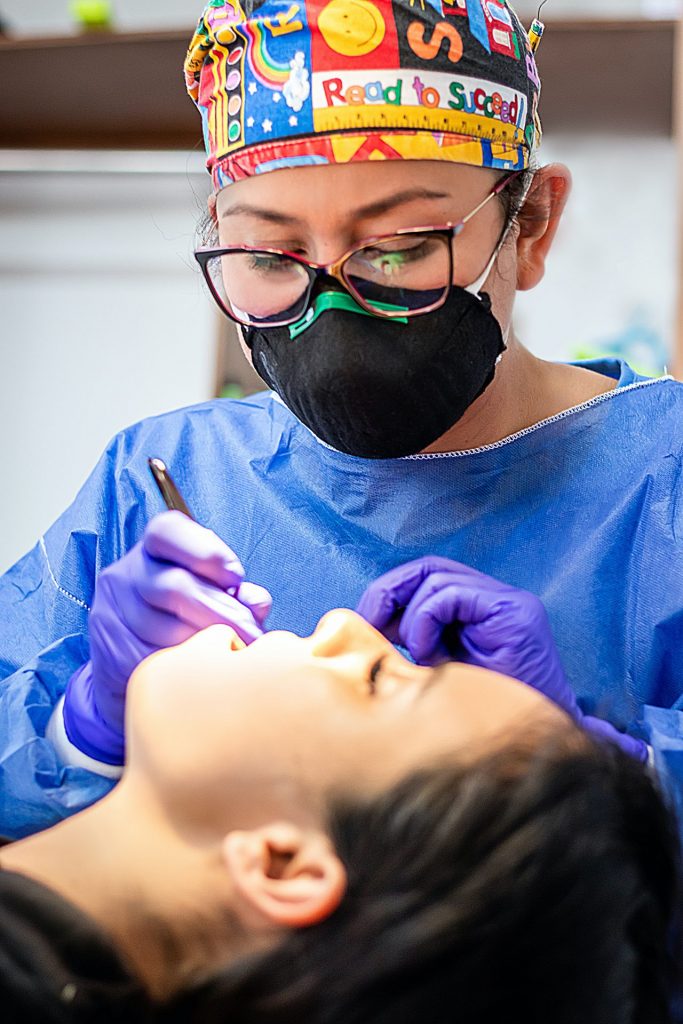
When is the best time to switch from a pediatric dentist to a general dentist?
As your child grows up, you may wonder if it’s time to switch from a pediatric dentist to a general dentist. While it’s ultimately up to you and your teen to decide, there are a few factors to consider before making the switch.
Our Pediatric dentists specialize in treating children, from infancy through adolescence, catering to their unique dental needs and concerns. However, as children grow older, their dental requirements may evolve, necessitating a careful consideration of their dental care providers. While the general recommendation is for teens to continue seeing a children’s dentist until they reach the age of 18, it is crucial to acknowledge the ongoing changes in their facial and jaw structures, as well as any orthodontic concerns that might arise during this transitional phase.
At Petit Smiles, we understand the significance of proper dental care for teens. Despite their physical growth and the replacement of their baby teeth with permanent ones, the structure of their mouth, jaw, and face continues to transform. These changes can have an impact on their oral health and may require specialized attention. Therefore, the expertise and experience of a pediatric dentist remain invaluable in ensuring that teenagers receive the necessary dental care and guidance during this critical period of development.

One of the primary reasons why it is advisable for teens to continue seeing a pediatric dentist is the ongoing changes in their oral structures. Although most of the changes to their face and jaw structure will have slowed or stopped by the age of 18, it is still important to closely monitor their dental health. The pediatric dentist can evaluate the alignment of their teeth, the development of wisdom teeth, and other potential issues that may arise. By regularly visiting a pediatric dentist, teens can receive appropriate preventive measures and treatments to address any concerns early on, promoting optimal oral health and reducing the likelihood of future complications.
Furthermore, the transition from childhood to adulthood is a time of unique challenges and adjustments. While teenagers may no longer be considered young children, they are still navigating the path to adulthood. The emotional and physical changes that accompany this phase can have an impact on their oral health. Stress, hormonal changes, and lifestyle factors such as diet and oral hygiene habits can all influence their dental well-being. Pediatric dentists are well-versed in understanding the specific needs and concerns of teenagers and can provide tailored guidance and support to help them maintain healthy smiles throughout this transitional stage.
During adolescence, the eruption of wisdom teeth is a common occurrence. Wisdom teeth, also known as third molars, usually begin to emerge between the ages of 17 and 25. However, not all individuals have sufficient space in their mouths to accommodate these additional teeth. This can lead to impaction, where the wisdom teeth become trapped beneath the gum line or grow at awkward angles. Impacted wisdom teeth can cause pain, swelling, and potentially lead to infection or damage to neighboring teeth. Pediatric dentists are trained to identify and monitor the development of wisdom teeth and can recommend appropriate measures, such as extraction if necessary, to prevent complications and maintain oral health.
Moreover, maintaining good oral hygiene practices is essential for teenagers. The teenage years are a time of increased independence, and teenagers often become more responsible for their own oral care routines. However, they may still need guidance and supervision to ensure they are properly caring for their teeth and gums. Pediatric dentists can educate teens about the importance of brushing and flossing regularly, as well as provide advice on diet and lifestyle choices that can impact oral health. By continuing to see a pediatric dentist, teenagers can receive ongoing support and encouragement to develop and maintain healthy oral hygiene habits that will benefit them throughout their lives.
In addition to their expertise in oral health, pediatric dentists have a unique ability to communicate and build rapport with teenagers. They understand the specific concerns and challenges faced by this age group and can establish a trusting and comfortable environment for dental visits. This is particularly important as some teenagers may feel anxious or fearful about dental procedures or may have had negative experiences in the past. Pediatric dentists are trained in techniques to alleviate dental anxiety and ensure that teens feel relaxed and at ease during their appointments. By fostering a positive dental experience, pediatric dentists can help teenagers develop a lifelong positive attitude towards dental care and oral health.
| Recommendation | Description |
|---|---|
| Continue seeing a pediatric dentist | Teens are advised to continue seeing a pediatric dentist until they reach the age of 18. Pediatric dentists are specialized in addressing the unique dental needs and concerns of teenagers, ensuring they receive appropriate care and guidance during their transitional phase. |
| Monitor ongoing changes in oral structures | Even though most facial and jaw structure changes slow down or stop by the age of 18, it is crucial to monitor dental health during this time. Pediatric dentists can evaluate teeth alignment, wisdom teeth development, and other potential issues that may arise, providing preventive measures and treatments to promote optimal oral health and prevent future complications. |
| Address orthodontic concerns | Orthodontic issues, such as wisdom teeth eruption and potential impaction, should be monitored and addressed by a pediatric dentist. They can identify any problems and recommend appropriate measures, including extraction if necessary, to prevent pain, infection, and damage to neighboring teeth. |
| Educate and promote good oral hygiene | Pediatric dentists play a crucial role in educating teens about proper oral hygiene practices. They can provide guidance on brushing and flossing techniques, offer advice on diet and lifestyle choices that impact oral health, and encourage the development of healthy oral care habits that will benefit teens throughout their lives. |
| Alleviate dental anxiety | Pediatric dentists are trained to communicate and build rapport with teenagers, creating a comfortable and trusting environment for dental visits. They employ techniques to alleviate dental anxiety and ensure that teens feel relaxed and at ease during appointments, fostering a positive dental experience and promoting a positive attitude towards dental care. |
These recommendations highlight the importance of continuing dental care with a pediatric dentist during adolescence and emphasize the specialized expertise and support they can provide for teenagers’ dental health.
In conclusion, while teens are no longer young children, their dental needs and concerns persist as they undergo significant physical and emotional changes during adolescence. The ongoing transformations in their facial and jaw structures, along with the potential for orthodontic issues and the eruption of wisdom teeth, make it essential to consider continuing their dental care with a pediatric dentist until the age of 18. Pediatric dentists possess the specialized knowledge and experience required to address the unique challenges faced by teenagers, providing comprehensive dental care, guidance, and support during this critical transitional stage. By seeking professional advice from a pediatric dentist, parents can ensure that their teens receive the optimal dental care necessary for maintaining a healthy and confident smile well into adulthood.
At Petit Smiles, we strive to provide the best dental care for infants, children, and adolescents in the Coral Gables and Doral area in Florida. Please feel free to contact us if you have any questions about your teen’s dental health.


